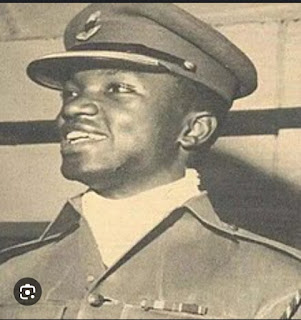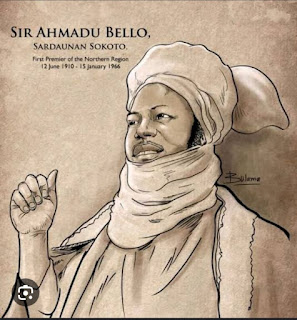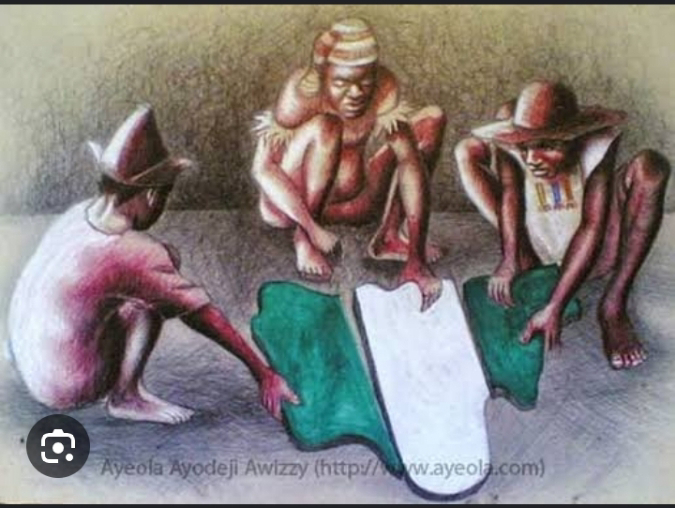January 1966 Coup, An Essay On The Coup Plotters And The Execution/Results Of The Coup
Major Chukwuma Kaduna Nzeogwu
Coup Plotters And Their Plans
"In the name of the Supreme Council of the revolution of the Nigerian armed forces, I declare martial law over the northern provinces of Nigeria". Those were the words that open the speech of major Chukwuma Nzeogwu in which he announced the 15 January 1966 coup.
The three major leaders of the 1966 coup are; Major Adewale Ademoyega, Major Emmanuel Ifeajuna and Major Chukwuma Nzeogwu. Ademoyega in his book "Why We Struck" talks about building a great friendship with Nzeogwu and Ifeajuna when he enlisted into the army in 1961. The three politically conscious young men believed in a military revolution to "shake up" the new Nigerian State. Over the years that followed the trio's aspirations solidified into a plot, and as politicians misgovernance worsened, the officers got more recruits into their fold.
The plotters plan to strike at the federal capital Lagos, and all four regional capitals namely Kaduna, Ibadan, Enugu and Benin. Nzeogwu was the original commander of the coup in the Northern Nigeria, with Onwuatuegwa as a co-commander. The commander in Lagos was Ifeajuna and co-commanders were Anuforo, Chukwuka, Ademoyega and Okafor.
Nzeogwu was known to tell young officers at the Nigerian Military Training, college Kaduna where he was Chief Instructor, "wait until the day you look at the senior officers through the sights of your rifle". One officer was sufficiently concerned to report Nzeogwu to their superiors, namely Colonel Ralph Shodeinde and Brigadier Samuel Ademulegun. Shodeinde did not take action but rather noted that "there is never smoke without fire, even if it is smoldering fire". Brigadier Ademulegun, wrote that Nzeogwu was a young man in a hurry who needs to be closely watched. Both men paid for thier lax approach to the complaints with thier lives on January 15th 1966.
Coup In The North
In the north, the coup took place under the cover of a three-day nightime training exercise called Exercise Damisa(Hausa for leopard). As Chief Instructor, Nzeogwu could organise such exercises without arousing any suspicion. On the final night of the exercise-midnight, 14th January-he told the officers the real purpose of the exercise. The group made up of military personnel from all parts of Nigeria, welcomed the idea of a coup to unseat the unpopular government. Nzeogwu said in an interview with the now-defunct kaduna based "New Nigerian" newspaper on 18th January 1966. "On Saturday morning the other officers and Men thought they were going out on a night exercise. It was not until they were out in the bush that they were told the full details of the plan... Any man had the chance to dropout. More than that they had bullets but I was unarmed. if they had disagreed they could have shot me... Most of the other ranks were northerners but they followed... It was a truly Nigerian gathering.
Nzeogwu and his officers either killed or were responsible for the death of the following political and military leaders in Kaduna.
Ahmadu Bello- The Premier of the North
Hafsatu Bello- Wife of the Premier
Brigadier Ademulegun- Commander of the first brigade
Colonel Ralph Shodeinde- Nigerian Military Training College commandant
Latifat Ademulegun- The Brigadier's wife
Zarunmi Sardauna- Ahmadu Bello's bodyguard
Ahmed Ben Musa- The Premiers senior assistant secretary for security
Ahmed Pategi- A government driver
Coup In The South
In Lagos Ifeajuna, in his capacity as commander of the coup in Lagos then Nigeria's capital, sent the signal to other operators outside Lagos to strike. He code-named the Coup in Lagos "Operation New Wash". The coup fairly was successful as they managed to eliminate senior political offices, but also failed, as Ironsi the then army GOC (General Officer Commanding) managed to escape, he could get all army officers to obey obey his orders and had unfettered access to all army installations. He could also link up with the police and government agencies, as well as seek the help of foreign militaries though with government approval. Backed by many military and police officers, Ironsi put down the coup Lagos.
Coup Results
Nzeogwu succeeded in the North, but he got no situation report from Lagos. To make matters worse, no broadcast came, except the announcement about dissident soldiers carrying out a mutiny. So Nzeogwu went on air with his infamous broadcast. Two powers now existed in Nigeria; The North under Nzeogwu and the south under Ironsi. War seemed imminent as Nzeogwu was bent on finishing the coup. What was left of the civilian government was handed over to Ironsi, it took a written agreement between Nzeogwu and Ironsi whose position was by no means secure and a personal intervention from Lt.Col.Conrad Nwafo, for Nzeogwu to agree to go to Lagos. The agreement stipulated that Nzeogwu and his colleagues will not be tried for their coup, that those of them already detained will be released, that the people they overthrew will not be returned to power and the families of military personnel killed in the Coup will be compensated.
Evidence shows that Nzeogwu did not really want war only political change, he handed the governorship of the North to Major Hassan Usman Kastina, son of the Emir of Kastina and flew to Lagos where Ironsi's men arrested him at the airport and bundled him to detention. Virtually all the principal plotters were arrested including Ifeajuna who had fled across the border and ended up in Ghana were he was welcomed by president kwame Nkrumah a formidable ideological foe of Balewa. The Coup was contained but the damage has already been done and Nigeria was officially on the brink of collapse.



Comments
Post a Comment